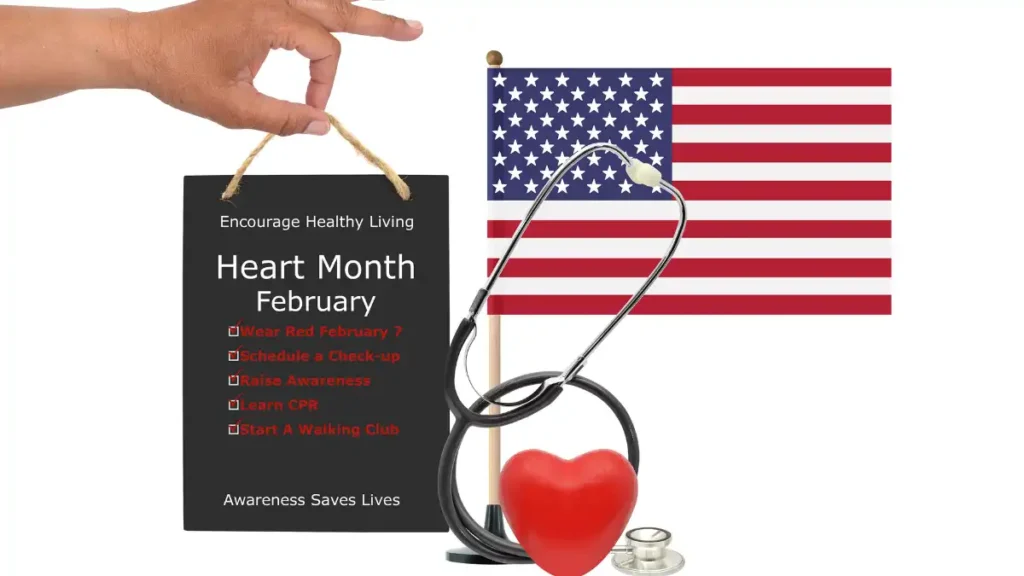February marks the observance of American Heart Month, a dedicated period to raise awareness about cardiovascular health. In a world where heart diseases continue to be a leading cause of mortality, understanding the significance of maintaining a healthy heart becomes paramount.

History of American Heart Month
In 1963, President Lyndon B. Johnson took a pivotal step in addressing the growing concerns surrounding heart disease by establishing American Heart Month. This bold move marked the beginning of an annual observance designed to draw attention to the widespread impact of cardiovascular issues on public health. Initially conceived as a focused initiative, the observance has undergone significant evolution over the years. What began as an awareness campaign has transformed into a multifaceted effort, touching on crucial aspects such as prevention, education, and support. American Heart Month has become a comprehensive platform, not only spotlighting the dangers of heart disease but also actively engaging communities and individuals in the pursuit of cardiovascular well-being.

Over the decades, American Heart Month has become a symbol of collective commitment to heart health. It transcends its origins, incorporating a broader spectrum of activities and programs aimed at addressing the multifaceted challenges posed by heart disease. The observance’s growth reflects society’s increasing recognition of the interconnected factors influencing cardiovascular health, including lifestyle choices, medical advancements, and community involvement. As we delve into the history of American Heart Month, we witness a transformation from a singular focus to a holistic approach that continues to shape and improve the nation’s cardiovascular landscape.
Risk Factors for Heart Disease
Comprehending the risk factors associated with heart disease is paramount for effective prevention and overall cardiovascular well-being. Lifestyle choices wield considerable influence in this regard, with poor dietary habits, sedentary lifestyles characterized by a lack of exercise, and smoking emerging as significant contributors. A diet high in saturated fats, cholesterol, and excessive salt intake can elevate the risk of developing heart issues. Likewise, a sedentary lifestyle devoid of regular physical activity can lead to obesity, hypertension, and other conditions that heighten susceptibility to heart disease. The detrimental impact of smoking on cardiovascular health is well-established, as it not only damages blood vessels but also contributes to the accumulation of plaque, raising the risk of heart-related complications.

In addition to lifestyle factors, genetic predispositions also play a pivotal role in influencing an individual’s susceptibility to heart disease. Familial history of heart-related issues can increase the likelihood of developing similar conditions. Recognizing these genetic factors underscores the importance of proactive measures in managing and mitigating potential risks. In essence, understanding the multifaceted nature of risk factors empowers individuals to make informed choices, adopt heart-healthy lifestyles, and take preventive actions to safeguard their cardiovascular health.
Preventive Measures
Adopting preventive measures is crucial for cultivating a heart-healthy lifestyle that promotes overall cardiovascular well-being. Central to this is maintaining a balanced diet characterized by the inclusion of fruits, vegetables, and whole grains. These nutrient-rich components provide essential vitamins, minerals, and antioxidants that contribute to heart health by supporting optimal functioning and reducing the risk of cardiovascular diseases.
Equally vital is engaging in regular physical activity. Exercise not only aids in managing weight but also plays a pivotal role in strengthening the heart muscle, enhancing circulation, and promoting overall cardiovascular fitness. By incorporating moderate-intensity activities such as brisk walking, jogging, or cycling into daily routines, individuals can effectively reduce the risk of heart-related issues. Additionally, regular exercise contributes to better blood pressure control, improved cholesterol levels, and enhanced glucose metabolism, all of which are integral components of a comprehensive approach to heart disease prevention.
In essence, adopting a heart-healthy lifestyle involves a synergistic combination of nutritious dietary choices and regular physical activity. These preventive measures empower individuals to take proactive steps toward maintaining optimal cardiovascular health and minimizing the risk of heart-related complications.
Role of Awareness Campaigns
The role of awareness campaigns in promoting heart health cannot be overstated, as evidenced by the success of previous initiatives. These campaigns serve as powerful tools for disseminating crucial information about cardiovascular well-being, reaching diverse audiences, and fostering a collective understanding of the importance of heart health.
One key aspect of these campaigns is their educational impact. By providing accessible and comprehensible information about risk factors, preventive measures, and early signs of heart issues, awareness initiatives empower individuals to make informed decisions about their lifestyles. Education becomes a catalyst for positive change, encouraging people to adopt healthier habits and incorporate heart-protective measures into their daily lives.
Beyond education, successful awareness campaigns have the transformative ability to inspire individuals. Personal stories, testimonials, and relatable narratives shared during these campaigns create a human connection, motivating people to prioritize their heart health. The emotional resonance of such messages fosters a sense of empowerment, encouraging individuals to embark on journeys toward healthier lifestyles.
In essence, the role of awareness campaigns extends beyond mere information dissemination. It is a dynamic force that educates, inspires, and mobilizes individuals to proactively engage in activities that contribute to their cardiovascular well-being. As these campaigns continue to evolve, their impact remains a vital component in the collective effort to build a healthier and heart-conscious society.
Innovations in Cardiovascular Medicine
The landscape of cardiovascular medicine has witnessed remarkable advancements, marked by innovative treatments and cutting-edge surgical procedures that have significantly elevated outcomes for individuals with heart conditions. These strides in medical science play a pivotal role in reshaping the narrative around cardiovascular health and expanding the possibilities for effective intervention and care.
Innovative treatments have emerged as game-changers in cardiovascular medicine. From novel pharmaceutical interventions to minimally invasive procedures, these advancements offer tailored solutions to address a spectrum of heart-related issues. Breakthroughs such as personalized medicine and targeted therapies showcase the precision and sophistication now achievable in the treatment of cardiovascular conditions, contributing to improved patient outcomes and enhanced quality of life.
Equally significant are the strides made in surgical procedures. Minimally invasive techniques, including robotic-assisted surgeries and catheter-based interventions, have revolutionized the field, providing alternatives to traditional open-heart procedures. These approaches not only reduce recovery times and postoperative complications but also offer a more patient-friendly experience.
As the field of cardiovascular medicine continues to evolve, ongoing research holds the promise of even more groundbreaking discoveries. Researchers are exploring innovative therapies, such as regenerative medicine and gene therapies, with the potential to further enhance treatment options and outcomes. The integration of technology, including artificial intelligence and telemedicine, is also expanding the reach of cardiovascular care, ensuring that patients receive timely and personalized interventions.
In essence, innovations in cardiovascular medicine stand as a testament to the relentless pursuit of excellence in healthcare. These advancements not only elevate the standard of care but also instill hope for a future where cardiovascular conditions can be effectively managed, if not entirely prevented. As research continues to unlock new frontiers, the horizon of possibilities in cardiovascular medicine remains expansive, promising a healthier and more resilient future for those facing heart-related challenges.
Prominent Organizations and Their Initiatives
Numerous organizations play a pivotal role in championing heart health, contributing to a collective effort aimed at enhancing the well-being of individuals. These entities, spanning both public and private sectors, actively engage in a spectrum of initiatives that range from groundbreaking research to community-focused events, fostering a holistic approach to cardiovascular care.

Prominent organizations in the realm of heart health often spearhead extensive research endeavors. By investing in scientific exploration, these entities strive to deepen our understanding of cardiovascular diseases, uncovering new insights into prevention, treatment, and management. Research outcomes inform evidence-based practices and contribute to the development of innovative strategies that have a lasting impact on public health.
Beyond the laboratory, these organizations are committed to reaching communities directly. They organize and support various community events, workshops, and awareness campaigns designed to educate the public about heart health. From heart screenings to educational seminars, these initiatives are tailored to empower individuals with the knowledge and resources needed to make informed decisions about their cardiovascular well-being.
Collaboration is a hallmark of these organizations, as they often work hand-in-hand with healthcare professionals, governmental bodies, and community leaders to maximize their impact. By fostering partnerships, these entities create a network of support that extends the reach of their initiatives, ensuring that heart health remains a priority on both individual and societal levels.
In essence, the efforts of prominent organizations in promoting heart health reflect a comprehensive commitment to improving cardiovascular outcomes. Through research, community engagement, and collaborative initiatives, these entities contribute significantly to the broader mission of enhancing the overall well-being of individuals and fostering a heart-conscious society.
The Intersection of Mental Health and Heart Health

Understanding the intricate relationship between mental health and heart health is paramount in fostering a holistic approach to overall well-being. Heart diseases not only affect the physical aspect of an individual but also carry a significant emotional burden. Recognizing and addressing the emotional impact is essential for comprehensive cardiovascular care.
Stress, anxiety, and depression can exacerbate the risk and complications associated with heart diseases. Managing these mental health challenges is, therefore, a crucial aspect of maintaining optimal heart health. Chronic stress, for instance, can contribute to high blood pressure and inflammation, both of which are detrimental to cardiovascular health. Anxiety and depression, when left unaddressed, may lead to unhealthy lifestyle choices, such as poor dietary habits and sedentary behavior, further escalating the risk of heart-related issues.
Creating a holistic approach involves integrating mental health care into cardiovascular management strategies. This may include counseling, stress management techniques, and mindfulness practices. By addressing the emotional well-being of individuals with heart diseases, healthcare professionals contribute to a more comprehensive and effective treatment plan.
Moreover, individuals themselves play a role in maintaining a positive mental state. Engaging in activities that bring joy, practicing relaxation techniques, and building a robust support system are essential components of emotional well-being. This intersection of mental health and heart health underscores the importance of a balanced and holistic approach that considers both the physical and emotional aspects of an individual’s well-being. By recognizing and addressing the emotional impact, we move closer to a more integrated and patient-centric model of cardiovascular care.
Global Impact of Heart Diseases
The impact of heart diseases transcends national boundaries, emphasizing the critical need for global collaboration in addressing this pervasive health challenge. Recognizing that heart diseases affect people across continents, concerted efforts on a global scale are imperative to develop effective strategies for prevention, treatment, and management.
One of the cornerstones of global collaboration in combating heart diseases is shared research. By pooling expertise and resources from around the world, researchers can gain a more comprehensive understanding of the diverse factors influencing cardiovascular health. Collaborative studies lead to insights that benefit populations globally, informing evidence-based practices and advancing the collective knowledge base in the field.
In addition to research, the sharing of resources is essential for tackling heart diseases on a global scale. This includes medical technologies, treatment protocols, and educational materials that can be adapted to diverse cultural contexts. By fostering an environment of resource-sharing, countries and organizations contribute to a more equitable distribution of knowledge and tools to combat heart-related issues.

Initiatives aimed at improving heart health worldwide further exemplify the commitment to global collaboration. These initiatives often involve partnerships between governments, non-profit organizations, healthcare professionals, and communities. By working together, these entities can implement programs that address the unique challenges faced by different regions, taking into account cultural, economic, and social factors.
In essence, the global impact of heart diseases necessitates a united front against this health epidemic. Shared research, resources, and initiatives underscore the interconnectedness of our world and emphasize the importance of collective action in improving heart health on a global scale. Through sustained collaboration, we move closer to a future where the burden of heart diseases is significantly reduced for people worldwide.
Conclusion
In conclusion, as we bid farewell to another American Heart Month, the significance of ongoing awareness and proactive measures cannot be overstated. The collective effort of individuals embracing heart-healthy lifestyles is paramount in our shared mission to reduce the prevalence of heart diseases. While the dedicated month may conclude, the commitment to cardiovascular well-being must persist throughout the year.
Also Read: Not Dead Yet Season 2 Streaming
American Heart Month serves as a reminder that each individual plays a crucial role in shaping the landscape of heart health. The small, daily choices, from dietary habits to exercise routines, accumulate into a powerful force for prevention. By staying informed, making conscious decisions, and prioritizing heart health, individuals contribute to a ripple effect that extends beyond personal well-being to positively impact communities and society at large.
In this ongoing journey, sustained awareness and education are key. Whether through continued engagement in heart health initiatives, participation in community events, or the sharing of knowledge within one’s social circles, the commitment to raising awareness should endure. By fostering a culture of proactive cardiovascular care, we pave the way for a future where heart diseases are minimized, and the overall health and vitality of individuals thrive.
As American Heart Month fades into the calendar, let it leave behind a lasting legacy – a legacy of empowered individuals who understand the importance of heart health and actively work towards a collective goal of reducing the impact of heart diseases. The journey continues, and with each step taken, we move closer to a healthier, heart-conscious future for all.
Alerts7.com… Follow us on News Whatsapp Group / Cinema Whatsapp Group / Jobs Whatapp Group / Commen Whatsapp Group மற்றும் Telegram Chennel !
